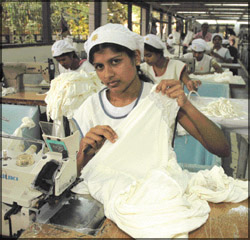Tea, garments win buyer approval for labour practices
Sri Lanka’s biggest exports, tea and garments, are gaining
global recognition for ensuring workers’ rights and welfare.
Products like “ethical teas” and “ethical bras” (lingerie), which
recognise labour rights in the workplace, have gained significant
consumer loyalty in U.S. and European markets.
Chairman of the Joint Apparel Association Forum (JAAF) Ashroff Omar
says that when foreign buyers visit Sri Lankan garment factories, they
are surprised by the standards.
The United States is Sri Lanka’s largest customer, buying 58 per cent
of total export production, followed by the European Union, which takes around 37 per cent.
the European Union, which takes around 37 per cent.
Garment factories have transformed, with some even installing
automatic cash machines and providing accommodations for workers.
Earlier this year, the garment industry launched a
multi-million-rupee image-building programme to position the country
globally as an ethical clothing producer.
The collective industry label and image building campaign, called
“Made in Sri Lanka: Garments without Guilt”, is aimed at differentiating
Sri Lanka from mounting competition, particularly China and India, by
carving out an “ethical” niche.
Equally, welfare for plantation workers has undergone a radical
change. Tea is the second largest commodity export. The once
marginalised labourers, who lived in tiny, shanty-type accommodation
called “line rooms”, now reside in modern apartment blocks.
And, for the first time since their forebears were brought from south
India by British colonialists to build Sri Lanka’s tea and rubber
estates, the post office has started delivering letters to their
doorsteps. Workers have been allotted separate house numbers after
nearly two centuries.
Trade unions in both sectors grudgingly concede that welfare
conditions have improved. “I agree there have been improvements but
setting up unions is still a problem in factories,” Anton Marcus, a
unionist in the garment industry, said.
He spoke a few days after a strike over wages at a suburban factory
was called off following negotiations with the factory management —
unheard of until a few years back.
Chairman of the Institute of Social Development, a non-governmental
organisation supporting workers’ welfare P. Muthulingam in the
plantations, agrees there has been some improvement in working
conditions.
But not for all workers, he hastens to add. Some 30 per cent of the
near 500,000 plantation workers still live in dilapidated housing.
The Kelani Valley Plantations Ltd (KVPL), one of the top tea
companies and part of the giant Hayleys Group in Sri Lanka, has vowed to
adhere to the United Nations principles of good governance at the launch
of its ethical tea brand, the first in the world.
The company, which promotes social responsibility, was recently
invited by the UN Global Compact (GC) that was launched by former UN
secretary general Kofi Annan, to hold a press conference at the UN
headquarters in New York about its work.
KVPL general manager in charge of business development, Suthesh
Balasubramanian told IPS that the UN principles deal with human rights,
labour, preserving the environment, fighting corruption, among others.
“We plan to send a report to the GC every year on the progress
towards achieving these objectives,” he said.
The company produces the “purest tea in the world”, he says, because
it offers a home for every worker, in addition to other facilities and
benefits.
It may not be the case in all plantations in Sri Lanka but the
situation is improving, with estates desperate to attract youth seeking
more dignified jobs, and the need to retain the staff.
Sri Lanka’s MAS Holdings, a world class lingerie manufacturer that
supplies to major brands such as Victoria’s Secret, Gap, Marks & Spencer
and Nik, is stepping up ethical standards in programmes empowering
women, spending three to four per cent of costs on employee and
philanthropic programmes.
Its “Women Go Beyond” programme, for example, is aimed at educating
and empowering its over 90 per cent female workforce, who are provided
transport to work, free meals, medical care and on-site banking at all
MAS plants in nine countries.
It also funds hospitals, schools and scholarships in the villages
where its plants are located.
“We believe strongly that if the people we work with have their basic
needs taken care of, they are freer to concentrate on the work at hand
and bring out their best,” Mahesh Amalean, the company chairman, said in
a company statement.
The ethical branding strategy would help meet consumer expectations,
says Kumar Mirchandani of JAAF.
“What we get is an intangible premium. We can’t go to buyers and say
pay more for our products because we are ethical and we don’t use
children, but we can make buyers feel more comfortable buying from us,”
he explains. IPS |

